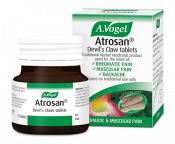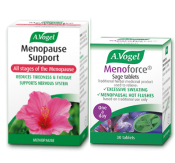Today's topic
Hello, and welcome from my video blog from home. And today on A.Vogel Talks Menopause, I'm going to be asking, "Can the menopause cause leg aches?"
Yes, menopause can cause leg pains and there are several different ones you can experience
Leg pain and stiffness
You can get leg muscle aches and pains and joint aches and pains, and you can get a lot of stiffness as well. And very often, these all tend to come together.
The reason this can happen is, first of all, our big joints such as our hips and our knees, these are high impact joints. They are being used all the time, and we put a lot of our weight on these joints. And very often, these are the ones that start to show pain and discomfort first.
But you can get joint and muscle aches and pains basically anywhere and a lot of other joints can be affected. Some women say it often feels like the day after they've had a really hard session at the gym. There's nothing specific that you can pinpoint but you just feel really achy and very uncomfortable or in pain, too.
What can happen, too, is that the joint pain and stiffness, if it keeps up, it can pull on other muscles and joints so your whole posture can end up getting out of line.
A number of years ago, I was gobsmacked to find out that if you have pain in your feet, that can sometimes be caused by the fact that your lower back is out of line.
So, if we allow these aches and pains to continue, then very often, it can put more and more strain on other areas of our body and then everything else gets that more difficult to resolve and treat.
Leg cramps
You can sometimes get leg cramps. A lot of women find that these tend to occur just as you get into bed. You're just trying to drop off and suddenly, your calf muscles just seize up and that can be absolutely excruciating. This is something I have experienced that myself.
Other causes of leg pain
You can also get leg pain due to varicose veins. Our veins can become weaker as we go through the menopause. It's all part and parcel of the lower oestrogen picture. And if you're getting a lot of varicose veins, that will give you a lot of leg ache and also, you can get things like swollen ankles and swollen feet. However, there can be quite a few different reasons for swollen feet and swollen ankles during menopause. It could be an indication of high blood pressure, so it's really important to get this one checked out by your doctor.
The other thing that can happen is you can get restless legs, and very often that can happen at night.
What can help ease my aching legs?
 So, what can you do to help yourself if you're starting to get these kinds of aches and pains?
So, what can you do to help yourself if you're starting to get these kinds of aches and pains?
Water
Water is so important. Falling oestrogen or low oestrogen levels can interfere with our body's ability to keep itself hydrated. And one of the areas that can get dehydrated really quickly is your joints.
So, if your joints start to get dehydrated, they're going to seize up. They're going to become a lot stiffer and that is going to contribute to your localised or all over body discomfort. So, water can honestly make a huge difference so definitely, don't forget that one.
Magnesium
This is really important, especially if you're getting the muscle cramps because magnesium is very important for muscle function. And we know that during the menopause that because of other things going on, your magnesium needs go up.
And if you're not getting enough, then something, somewhere is going to be low in magnesium and very often, that is the muscles.
Stretching
Stretching regularly is also important. One of the things that happen as we get older is that we get stiffer and that will affect the support of our joints.
Keeping your flexibility up as you age is very important. There are lots of super little daily exercise videos on YouTube that can help show you how to stretch properly. I often do my stretching when I am waiting about, for example when I'm in the office waiting at the photocopier or if I'm in the kitchen, I'll touch my toes and stretch backwards or stretch sideways.
So doing little and often can help to keep your muscles and your joints that little bit freer.
Herbal helpers
If you're getting joint or muscle inflammation, there is a herb called Devil's Claw which can be very helpful. It's a nice one with very few contraindications. You can take it with HRT, and it works very nicely for these kinds of minor aches and pains.
You can also look at arnica gel for localised pain relief. Arnica gel is also really good after sports. If you're doing a really heavy session or if you like to run but find that your muscles get much more painful afterwards, then you can apply the gel as soon as you finish exercising.
My Top Tip:

Atrosan Devil's Claw tablets are best taken after food. If your joint pain is troublesome, start off with a higher dose. Take two tablets, twice daily for 3 to 5 days, then 1 tablet, twice daily.
"Really does deal with pain."

Look out for diet triggers
The other really important thing to remember is that certain foods and drinks can irritate the muscles and the joints. Especially for joint pain, triggers can be drinks such as caffeine drinks, fizzy drinks and alcohol.
Food triggers include high-salt and sugary foods. Other foods to be cautious of are members of the deadly nightshade. These can be quite inflammatory for some people. These foods are your potatoes, your tomatoes, your aubergines, and your peppers.
If you're getting a lot of these aches, and pains, and joint inflammation, then maybe try cutting these out for a couple of weeks just to see if that makes any difference.
So, I hope you found this one helpful. As always, if you have any questions, if you have any comments, then please share them because we would love to read all about them.









